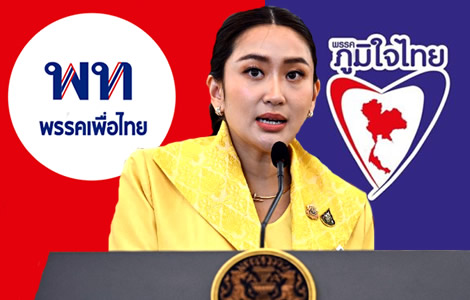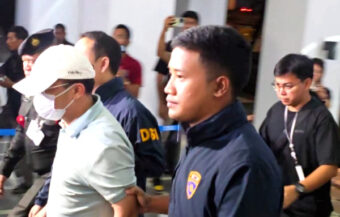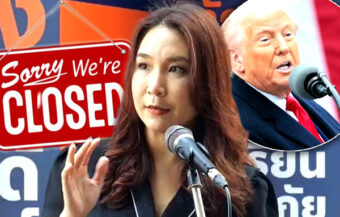Pheu Thai and Bhumjaithai parties emphasize cabinet unity, but the ruling coalition faces growing tensions. Legal challenges and investigations, including a potential dissolution threat, spark political instability as Paetongtarn’s popularity wanes in the latest NIDA poll.
In the last week, both the Pheu Thai Party and the Bhumjaithai Party have been assiduously talking up the stability of the government. Of course, there is no doubt that the present coalition has the numbers in parliament. Furthermore, neither party is likely to break ranks and run to the country to achieve a political coup de grâce. However, the reality is that the Pheu Thai Party may be facing a day of reckoning, with yet another Sword of Damocles hanging over the government. This relates to the Election Commission’s investigation of the party under the Political Parties Act of 2017. In short, this concerns the influence of former Prime Minister Thaksin Shinawatra over the ruling party as a non-member. On December 10, the commission confirmed that six complaints are being processed against Pheu Thai after an earlier review dismissed no fewer than 47 cases.

Undoubtedly, 2024 has been another year of turmoil in Thai politics. The year saw a botched cabinet reshuffle later leading to the fall of Prime Minister Srettha Thavisin. At the same time, independent organizations such as the National Anti-Corruption Commission (NACC) and the Election Commission were flooded with complaints against the Pheu Thai Party.
A recovering but weak economy with credit and cash flow sucked out of the financial system has simultaneously challenged the Pheu Thai-led government.
Street protests continue to challenge Pheu Thai-led government despite waning public support for mobs
In the meantime, we again saw street protests outside Government House in Bangkok. More are threatened in the new year. However, public support for such activities has dimmed through the decades. Indeed, the public, as well as the political class, are well aware of the damage done by the 2006 and 2014 coup d’états.
Former Minister of Finance and Deputy Prime Minister Kittiratt Na-Ranong was deemed inappropriate because of his political connections. In recent times, Mr. Kittiratt has acted as a government advisor.
Future Bank of Thailand Chairman Pick warns that the Thai economy faces ‘disaster’ without rate cuts
Pheu Thai and Bhumjaithai rift is real and widening despite the latest attempt to soothe concerns among the public
In addition, the proposed appointment drew former Bank of Thailand governors and economic experts out in opposition. At length, a letter with 700 signatures was submitted to the government opposing the move.
Growing rifts between Pheu Thai and Bhumjaithai parties creating deep political tension despite coalition pact
Meanwhile, in recent days, great efforts have been made to cement a picture of cabinet unity. Nonetheless, this cannot be the case given the fact that the Pheu Thai Party and Bhumjaithai Party are clearly at political loggerheads.
Firstly, the Bhumjaithai Party moved stealthily this year to consolidate control of the Senate. After that, the party used this influential position to oppose constitutional reform in parliament.
Of course, according to Deputy Prime Minister Anutin Charnvirakul this week, this is simply a matter of opinion and political emphasis. However, the legal dispute between the State Railway of Thailand and the Department of Land at the Ministry of the Interior is another potential rift.
In brief, the dispute centres on a 5,083-rai plot in Buriram’s Khao Kradong area. In essence, this is a battle between provincial administration regulation and national law. At this time, there is a Supreme Court order instructing the Department of Land to change the ownership of the land to the State Railway of Thailand.
Disputed land in Buriram linked to Bhumjaithai Party figures raises the potential for an escalating crisis
The land contains 12 holdings and 179 rai of land relating to the Chidchob family. The family is the force behind the Bhumjaithai Party. On this land are the soccer stadium for Buriram United and an international racing car circuit. Both are linked to the family’s business empire.
Certainly, Deputy Prime Minister Suriya Jungrungruangkit, who is Minister of Transport, has vowed to see the land returned to the State Railway of Thailand. In the meantime, it would appear all depends on any potential legal developments, which may trigger a crisis.
However, it may well be that this government can overcome this. However, the biggest threat to the government at this time lies with six complaints still being pursued by the Election Commission against the Pheu Thai Party.
All are linked to the Pheu Thai Party and the influence of the Prime Minister’s father, Thaksin Shinawatra, over it. In December, the Election Commission confirmed that some 47 cases had been similarly dismissed against Pheu Thai. However, these cases are still being pursued.
Legal challenges and ongoing complaints threaten to destabilise the Pheu Thai-led government
The ruling party was certainly buoyed by the November decision by the Constitutional Court not to accept a similar complaint. This was a legal action taken by lawyer Theerayut Suwankesorn under Section 49 of the Constitution. The basis for the decision was a lack of evidence and substance.
Undoubtedly, this is the same complaint being investigated by the Election Commission. However, the basis for consideration is entirely different. The constitutional challenges were based on a charge of overthrowing the state. In the meantime, the case being investigated is under the provisions of the 2017 Political Parties Act.
Certainly, the charge under the provisions of that act is far easier to prove. Indeed, the act was particularly designed to deal with a situation that presently exists. In short, former Premier Thaksin Shinawatra is certainly a key player and influencer of both the Pheu Thai Party and the government.
Election Commission Secretary-General and ex officio Registrar of Political Parties Sawaeng Boonme gave an update on these probes on December 10. In mid-October, he suggested that the investigations into the party and others were proceeding.
Ongoing investigations into political party activities and Mr Thaksin’s influence continues to fuel instability
For instance, Section 29 specifically prohibits a person who is not a member to “control, predominate, or instruct activities of a political party in a way that shall cause the political party and its members to either directly or indirectly be dependent.”
Undoubtedly, these complaints are the key threat to bringing the government of Ms. Paetongtarn Shinawatra at this time to a premature end.
Over the weekend, the Election Commission announced that it had dismissed complaints relating to the Bhumjaithai Party. These related to former Minister of Transport Saksayam Chidchob, who was removed by the Constitutional Court, and Buri Charoen Construction Co., Ltd. The Bhumjaithai Party had removed donations from the company, which simultaneously had contracts with the Transport Ministry. Similarly, a complaint linked to Mr. Suphawat Kasemsuthi and the Silachai Buriram Company Limited was also considered.
This was under Section 72 of the Political Parties Act, which prohibits donations from unlawful sources. In short, the party was cleared on both accounts.
The reason was that it had no way of knowing the nature of such donations. This was similar to the grounds applied to the dismissal of a case against the Palang Pracharath Party recently linked with a donation from a Chinese mobster.
Parties continue to vie for power as Paetongtarn suffers a decline in popularity in the latest NIDA poll
In the meantime, it is clear that both the Pheu Thai and Bhumjaithai Party wish the government to run its course. Therefore, in that sense, the claims of unity are real.
A key factor in recent months has been former Prime Minister Thaksin Shinawatra’s ability to wow audiences on the political campaign trails.
Significant Provincial Administrative Organisation presidency wins in Udon Thani and Ubon Ratchathani have buoyed hopes that the party can recover lost ground with the electorate.
The latter is a consequence of forming a government in 2023 with parties of the former military-led government. Notably, this includes the Bhumjaithai Party, which is now seen as more conservative and nationalistic. This is despite its groundbreaking legislation on cannabis in 2022.
However, the latest National Institute of Development Administration (NIDA) quarterly opinion polls have thrown up a surprise. Significantly, Ms. Paetongtarn Shinawatra has lost her place at the top of the public choice as Prime Minister.
She has been overtaken by the new leader of the People’s Party, the replacement party for the election-winning Move Forward Party. Therefore, the NIDA poll shows 37-year-old Nattapong Ruangpanyawut as the top choice for the role. He polled 29.85% of respondents.
Paetongtarn Shinawatra loses ground in new NIDA poll as public support shifts to Nattapong Ruangpanyawut
After that, 38-year-old Prime Minister Paetongtarn Shinawatra comes in second place. Her support level was 28.8%. Previously, Mr. Nattapong only polled 22.9%, while Ms. Paetongtarn polled 31.35%.
Certainly, it must be considered that the high-profile nature of her father, Mr. Thaksin, has to some extent undermined the Prime Minister’s public position or profile.
Of course, there may also be other factors, such as public reaction to the economy or flooding. Nonetheless, it is unusual that the PM has lost ground while the Pheu Thai Party appears to be advancing in former Redshirt strongholds boosted by Mr. Thaksin’s campaigning.
Significantly, also, the People’s Party’s support is up to 37.3% from 34.25% previously. The Pheu Thai Party came in at 27.7%, notably up from 27.15% in the last poll.
NIDA poll shows shifting political landscape with People’s Party gaining on Pheu Thai in party support rankings
Here are the results of the poll, first for the choice of PM:
1st: 29.85%, Mr. Nattapong Ruangpanyawut (Prachachon Party)
2nd: 28.80%, Ms. Paetongtarn Shinawatra (Pheu Thai Party)
3rd: 10.25%, Mr. Pirapan Salirathavibhaga (Ruam Thai Sang Chart Party)
4th: 6.45%, Mr. Anutin Charnvirakul (Bhumjaithai Party)
5th: 4.95%, Khunying Sudarat Keyuraphan (Thai Sang Thai Party)
6th: 1.70%, General Prawit Wongsuwan (Palang Pracharath Party)
Secondly, the ratings of the top political parties. In relation to individual party support, the quarterly political poll showed the following results:
1st: 37.30%, People’s Party
2nd: 27.70%, Pheu Thai Party
3rd: 10.60%, United Thai Nation (Ruam Thai Sang Chart) Party
4th: 5.15%, Bhumjaithai Party
5th: 3.55%, Democrat Party
6th: 3.05%, Palang Pracharath Party
7th: 2.50%, Thai Sang Thai Party
Certainly, the poll shows gains for the Bhumjaithai Party in addition to the United Thai Nation (Ruam Thai Sang Chart) and Palang Pracharath parties. Therefore, it would seem to suggest more engagement with politics. At the same time, this also indicates a political rift and polarization.
Pro-democracy parties continue to dominate the political scene with 67.5% support in this quarterly NIDA poll
However, the pro-democracy parties, including the People’s Party, Pheu Thai, and the Thai Sang Thai Party, enjoy 67.5% support. Meanwhile, the conservative-right parties and former coalition partners under General Prayut Chan-o-cha together have 22.35% support.
At the same time, it should be noted that the key element in this bloc is the United Thai Nation (Ruam Thai Sang Chart) Party. However, both the Palang Pracharath and the Bhumjaithai parties are able to secure significantly more seats pro rata to national support. This is linked to local power structures and figures on the ground.
Government firefights political instability as a fissure appears in the cabinet over disputed Buriram land
Thaksin warns that the media in Thailand has become too sensational and influential as he sues lawyer
Indeed, this is the nitty-gritty and the underbelly of Thai politics, where provincial power structures play a key role.
Join the Thai News forum, follow Thai Examiner on Facebook here
Receive all our stories as they come out on Telegram here
Follow Thai Examiner here
Further reading:
Thaksin calls for crypto-based bonds. Notes success and beauty of Isan women who marry foreigners
Future Bank of Thailand Chairman Pick warns that the Thai economy faces ‘disaster’ without rate cuts
Trump’s trifecta triumph means Thailand will be more on edge as he prepares to take power in January
Ung Ing congratulates Trump as Thailand uneasily confronts the meaning of his second Presidency
Paetongtarn’s government set to tackle the evil of chronic debt in Thailand as the tide still rises
Srettha’s crisis is not just an economic one, it is a ‘3D debt crisis’ that is strangling GDP growth


















